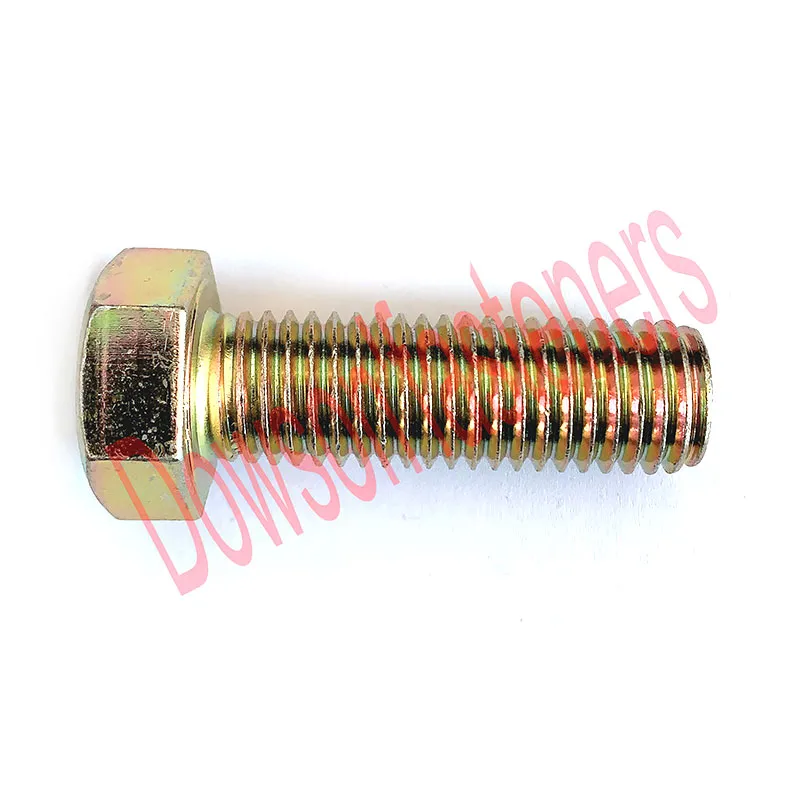Understanding Bolt Threads: Exploring the Differences between UNC, UNF, and UNEF
2024-10-26
Bolts play a crucial role in construction, manufacturing, and various engineering applications. These fasteners connect parts, stabilize structures, and provide security, and selecting the right bolt involves more than just choosing a size. One key consideration is the type of thread, as it affects the bolt’s grip strength, durability, and compatibility with the materials being joined. In this blog, we’ll explore the most common types of bolt threads—UNC, UNF, and UNEF—along with their applications and advantages.
Understanding Thread Terminology: What Are Bolt Threads?
A bolt thread is a helical structure that wraps around the body of a bolt. These threads allow the bolt to be screwed into a nut or tapped hole, creating a secure connection between components. Bolt threads can vary in size, shape, and pitch, all of which contribute to a bolt’s specific performance. When we discuss UNC, UNF, and UNEF threads, we’re referring to standardized thread classifications, with each type defining particular features like thread pitch and thread depth.
1. Thread Pitch: This measures the distance between threads on a bolt, often measured in threads per inch (TPI).
2. Thread Depth: The distance from the top of one thread to the bottom of the adjacent thread.
3. Thread Angle: The angle between the flanks of the thread, which affects how well the threads engage.
Understanding these aspects helps to clarify the differences between various thread types.
1. Unified National Coarse (UNC) Threads
Definition: Unified National Coarse (UNC) threads are a standard thread type with a coarser pitch than other variations. Coarse threads are wider, with a larger thread pitch, meaning there are fewer threads per inch.
Advantages:
- Increased Shear Strength: The coarse threads on UNC bolts provide excellent strength, making them suitable for applications that experience heavy stress.
- Quick Assembly and Disassembly: Coarse threads are easier and faster to work with, especially in field installations.
- Resistance to Damage: Due to the larger thread size, UNC bolts resist stripping and cross-threading better than fine-threaded bolts.
Applications:
- Common in construction and automotive industries.
- Ideal for assembly in softer materials, such as aluminum and plastics.
- Frequently used in applications that require repeated assembly and disassembly.
Drawbacks:
- UNC threads may loosen more easily than finer threads when subjected to vibrations.
- They lack the clamping force precision of fine threads, making them less suited to high-tolerance applications.
2. Unified National Fine (UNF) Threads
Definition: Unified National Fine (UNF) threads have a smaller pitch and a greater number of threads per inch compared to UNC threads. The finer pitch provides more engagement points, allowing for a tighter and more precise fit.
Advantages:
- Better Clamping Force: The increased thread count provides greater control over tension and torque, allowing for precise clamping.
- Vibration Resistance: UNF threads have a better ability to withstand vibrations without loosening, making them reliable for applications exposed to dynamic forces.
- Higher Tensile Strength: The shallow thread profile increases tensile strength, making UNF bolts ideal for high-stress applications.
Applications:
- Commonly used in the aerospace and automotive industries, where precision is essential.
- Preferred in applications requiring high clamping force and resistance to loosening under vibration.
- Ideal for use in harder materials, such as steel and other high-strength alloys.
Drawbacks:
- UNF threads can be challenging to use in field applications or when dealing with softer materials, as the finer threads are more prone to stripping.
- Finer threads make assembly slower, as more rotations are needed to fully engage the bolt.
3. Unified National Extra Fine (UNEF) Threads
Definition: Unified National Extra Fine (UNEF) threads are the finest among these three categories, with a higher TPI than both UNC and UNF. The threads are extremely shallow and close together, providing an even higher level of clamping force and control.
Advantages:
- Precision Clamping: The increased thread count and reduced pitch provide maximum control over torque, ideal for critical applications.
- Resistance to Loosening: UNEF bolts offer exceptional resistance to loosening, even under extreme vibration, due to the high friction created by the closely spaced threads.
- Improved Load Distribution: The increased thread count enables a more even distribution of load, essential for applications requiring long-lasting security.
Applications:
- Common in high-precision applications such as electronic components, instrumentation, and aerospace.
- Used in situations where minimal room is available for threading, such as with thin-walled components.
- Ideal for applications where a high degree of torque control and tensioning is required.
Drawbacks:
- Difficult to use in softer materials due to the risk of thread stripping.
- Assembly and disassembly can be time-consuming due to the high thread count and small pitch.
Selecting the right thread type—UNC, UNF, or UNEF—depends on the specific needs of the application, the material being used, and the environmental conditions. UNC threads are preferred for quick assembly and durability in softer materials, while UNF threads offer greater clamping control and vibration resistance for tougher applications. UNEF threads, on the other hand, are designed for high-precision settings, where load distribution and torque control are essential.
By understanding the characteristics and advantages of each thread type, engineers and manufacturers can ensure that their projects are built to withstand the demands of their intended applications. Proper bolt selection goes a long way toward achieving safe, secure, and reliable assemblies.



